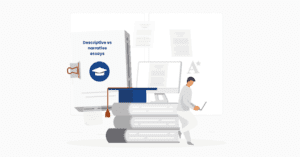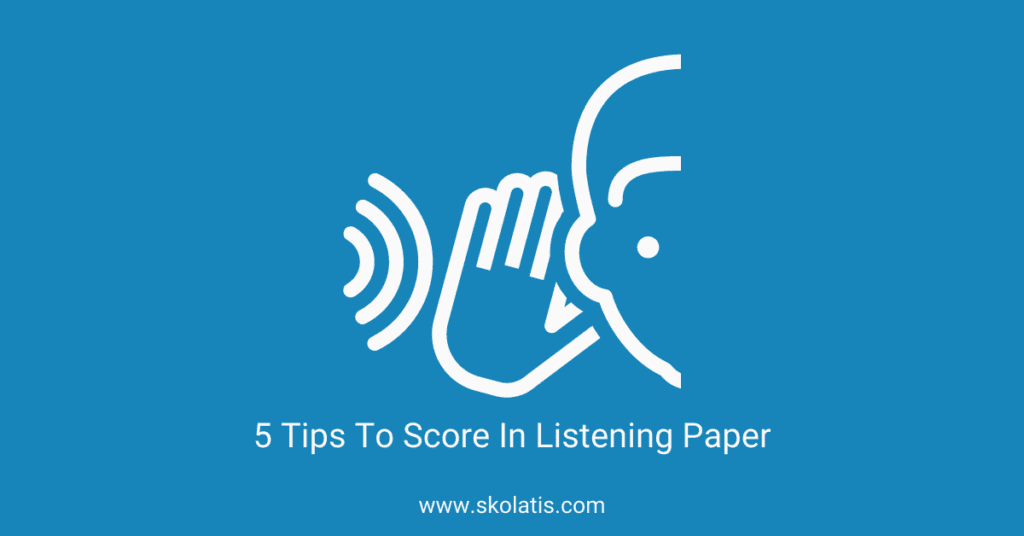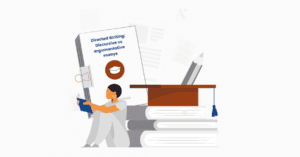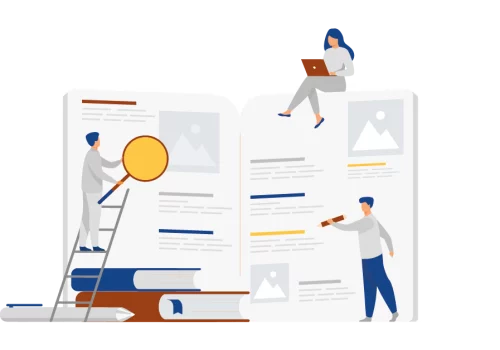
Descriptive vs Narrative Essays
The IGCSE English First Language exam places a strong emphasis on creative writing, with writing descriptive and narrative essays being
Learn how to write step-by-step answers, and score A* in your exam!

Announcement: Cambridge IGCSE, and AS & A Level November 2024 past papers are now available.
In Questions 1-6 of the Listening papers, you hear a series of short spoken items. The sentences are not connected. For each item, you answer one question as briefly as possible, often with just one or two words.
In Questions 7-10, you hear continuous, connected speech, and the questions may require you to complete a table of information, or complete some notes, or answer individual questions with short responses.
In the exam, you will be given time to read the questions before you hear the cassette/CD. Make sure you use this time well. Read all the questions and underline the keyword(s) in each one.
Decide what type of information each question requires; for example, a number, a place, a street name.
Some time, you’ll hear how some words are changing with the stress on different part of the words. For example: notice how the word interviewer changes to interviewee.
When spoken, the stress on these two words is different: interviewer, interviewee.
Other examples are employer and employee.
There are a small number of other ‘person’ nouns in English which end in -ee.
The last question in the Listening papers usually requires you to answer questions based on a talk or an interview. The questions may ask you to identify people’s feelings and attitudes, as well as testing you on general comprehension.
Note: make sure that you write clearly and that you include all the necessary information.
Listening papers contribute 30% (15% for private candidates) on your overall scores for your English as Second Language certificate. Don’t make the assumption that Listening paper is not important thus not making any attempt to learn the tactics and skills.
In fact, Listening papers could determine either you score A* or not in your IGCSE E2L paper.
The average preparation needed for Listening skills is one year. Best is two years, from getting acquaintance to mastering.
Join 60,657 (and counting) IGCSE & AS/A Level subscribers who’ve taken our insanely valuable FREE email courses. Learn exam tips & score A* in your exam!
Abhishek Bathina
Abhishek Bathina
Raunaq Nambiar
Raunaq Nambiar
Jyoti
Jyoti
Soham Santra
Soham Santra
Yusra
India
Yusra
India
Christina Theosabrata
Christina Theosabrata
Harsh Aryan
Harsh Aryan
Akshit Philip
Bahrain
Akshit Philip
Bahrain
Eva Muthusamy
Malaysia
Eva Muthusamy
Malaysia
Lanja Omer
United Arab Emirates
Lanja Omer
United Arab Emirates

The IGCSE English First Language exam places a strong emphasis on creative writing, with writing descriptive and narrative essays being

In the IGCSE English First Language Directed Writing task, you’ll be required to either write a speech, letter, or article

In Chemistry, writing a balanced chemical equation is a skill that needs practice. This article will discuss all the tips

In the face of violence and uncertainty, education stands as a beacon of hope, offering students the tools to navigate

Our best-selling exam essentials.

72 responses
Hey there!
i want to know weather cambridge is going to conduct ESL exams in next feb/march 2021
or it stands cancelled due to this pandemic.
Hello Ayush,
As far as we know all the CAIE exams will go ahead as planned.
We would also suggest that you keep in contact with your school/exam centre for any changes. Thank you.
Hey,
our schools is one of the centers for IGCSE exams. we do our exams there. Kindly tell me the best place to sit during listening exam as haven’t got any specific arrangements as of yet and the speaker most audible is at the front.
thank you in advance
Hi Malu,
Your school would have a specific arrangement for listening exam. You must address your concern with your school if you find yourself unable to hear the recording. Please know that you are allowed to request for adjustment of volume during the exam. We strongly suggest you to discuss this matter with your teacher.
The syllabus for English as a second language 0510 has been updated and report writing and review writing has been added. Any tips for report writing and review writing? Is there a particular format to be followed? Anything in particular we should know?
Hi Sam20,
Before you begin writing, decide if you?re going to write about the topic from two sides (for and against) or from just one (your opinion). If you write a two-sided (balanced) piece of writing, remember to include your opinion in the last paragraph. If you want to write only from your own point of view, include it in the first paragraph.
Furthermore, try to think of your own ideas on the topic which match the task and include them in your writing. For each of the ideas included in your answer, support them with evidence or examples. Note, the examiner knows that the evidence or examples will be made up and doesn?t expect these to be correct.
Lastly, remember to organise your writing: include an introduction, a middle section and a
conclusion.
Hey there!
I wanted to ask about how many points should we write in our summary?
If there are 12 points but there are 8 marks so can we mention 8 points or we’re supposed to cover all 12 points?
Hoping for a reply,
Thank you!
Hello Hadiyah,
For English First Language (0500), you should include all the points you?ve written in Question 3(a). On the other hand for English Second Language (0510/0511), you have to provide the number of points stated on the instruction. For example, if it says ?You will receive up to 8 marks for the content of your summary? then you have to write 8 (relevant) points in order to score full content marks. Remember, don?t repeat similar points ? repeated points will not contribute to extra marks, just add more words.
i exceed the lines given in the question paper during the exam. i just wrote directly below the line , below it was another question . i ask from the invigilator and he allows. will i face any consequences like deducting marks
Hi Jay,
Unfortunately, if you have written beyond the lines, there?s a chance that your answers will not fit into the scanned screen. If this happens, you will lose marks as the examiners won?t be able to see your full answers.
will the marks be deducted if there are spelling mistakes in hindi
Hi Asha,
Kindly refer to the marking scheme https://www.skolatis.com/cambridge-igcse-past-exam-papers/
Thank you for your help.
You’re welcome!
for english paper 2 (0500) in summary points ,we must give answers in short phrases and not full sentences,right?and the given line can be exceeded?or marks will be deducted for exceeding the lines?
Hi Catherine,
The important point in writing a Summary is to not go beyond the word limit. You must always use your own words when writing Summary. The points must be taken from the passage, but change them to your own words. Not all the words could be changed, for example, a chair is a chair, a hand is a hand? etc. You can?t possibly change all the words, just justify them. Lastly, do not write beyond the lines given, to avoid your answers not able to fit into the scanned screen.
Do refer to the syllabus: https://www.skolatis.com/cambridge-igcse-subjects-syllabuses/ to get a better idea of what is expected.
for english paper 2 (0500) in summary points ,we must give answers in short phrases right?and the given line can be exceeded?
Hi Catherine,
The important point in writing a Summary is to not go beyond the word limit. You must always use your own words when writing Summary. The points must be taken from the passage, but change them to your own words. Not all the words could be changed, for example, a chair is a chair, a hand is a hand? etc. You can?t possibly change all the words, just justify them. Lastly, do not write beyond the lines given, to avoid your answers not able to fit into the scanned screen.
Do refer to the syllabus: https://www.skolatis.com/cambridge-igcse-subjects-syllabuses/ to get a better idea of what is expected.
if i want to become a pilot which subjects should i take in IGCSE?
Hello Ibrahim,
The best place to find this out is to check with the college/university the you wish to apply to.
Hey, If you want to become a pilot, you have to choose Physics, Mathematics, Chemistry, English and any second language your like.
I have my physics paper on 1st and 7nt november and i am worried
any tips?
Hi Piyush,
With Physics, you?ll need a lot of practice. Start your revision as early as possible and spend at least 2 to 3 hours every day on revising:
1. Learn and understand the key concepts and formulas. Familiarise/memorise the key equations/formulas (refer to the latest syllabus on what is expected: https://www.skolatis.com/cambridge-igcse-subjects-syllabuses/ ).
2. Do revision based on the latest syllabus and practice with the latest past exam papers (https://igcsecentre.com/cambridge-igcse-past-exam-papers/ ). Pay attention to the most common mistakes you always seem to make. Make notes and revise them, so you can avoid making the same mistakes in your actual exam.
Tips:
Minimize your reference checks. Try solving a problem with the formula without looking it up. You MUST do this as many times as you can. You will be able to remember the formulas/key equations better when you repeat this step.